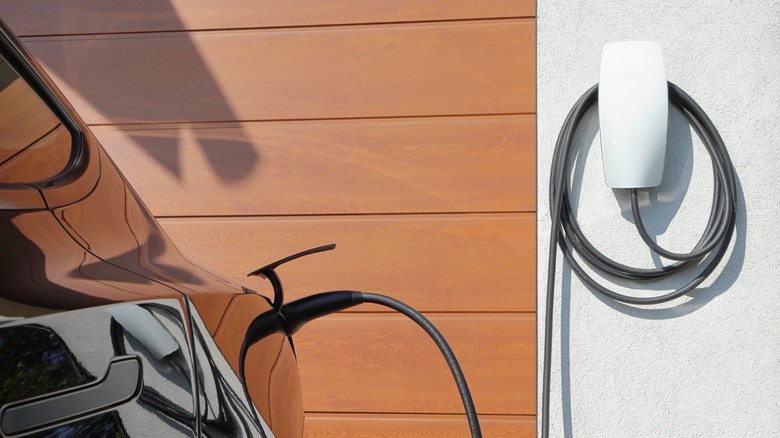Tesla Owner Shows Just How Cheap It Can Be To Charge An EV
One of the supposed upsides of buying an EV is that you no longer have to worry about traditional maintenance and operational costs, like oil changes and refueling. Data has even shown that a Tesla Cybertruck is cheaper to run than a Chevy Silverado, with the former costing between $105 to $112 per month when charging at home versus the $274 you need in gasoline. This is all well and good, but let's look at the experience of one particular user for a real-world example.
TikTok tech creator echainzz looks like he drives a Tesla Model 3, and he recently had a Tesla Wall Connector installed at his home. According to the TikTok post, his electric bill when he first moved into the house was $115. After he installed the charger and presumably did all his EV charging at home, his first monthly sat at $174, with his upcoming one expected to be $200. That means he's only paying an extra $59 to $85 to charge his car, which is a lot less than the average $130 to $200 that most Americans spend on fuel every month, according to CarParts.com.
@echainzz Is charging at home expensive? 🤔🚗⚡️ #tesla #teslacharging #ev
Aside from that, echainzz also says that he paid $20 a week to charge up his Tesla at a Supercharger, costing him $80 monthly. This isn't hugely different from what he's paying for at home, but it's not just the electricity cost that he's considering. Having a charger in his garage saves him at least 45 minutes weekly, as he can just plug the Tesla in as soon as he gets home. It also saves on waiting time during those situations where he has to recharge his vehicle during a particularly busy hour, but there are no available slots.
Some things to keep in mind when calculating EV charging costs
Of course, EV charging costs won't be the same for everyone, as there are several factors you need to consider. First off, electricity rates vary per area and may even change depending on the time of day, which is why Teslas come with a charge schedule function. This allows you to set up the time when your vehicle will take in power, ensuring that it will only use electricity when your rates are lower.
Aside from that, not all homes can support a charger. Your house's electrical wiring may have the capacity for a charger, requiring you to update or replace the wiring. So, before purchasing a home charger for your EV (or even considering buying an electric car in the first place), it's wise to consult with a licensed electrician if you need to make any changes. On a similar note, if you live in an apartment complex and don't have your own garage, you'll have to talk with your building management to see if it's even possible to have a charger installed at your parking spot in the first place.
Regardless of the costs, the best thing about having an EV charger at home is that you can keep it plugged in when you're parked, ensuring you'll always have a full charge on your vehicle. But if you can't install your own charger at home and there isn't a good EV charging network near your area, then maybe you should consider getting a hybrid vehicle instead.

